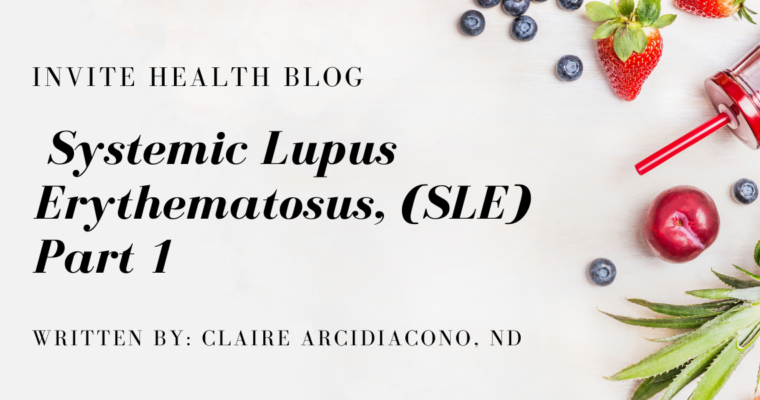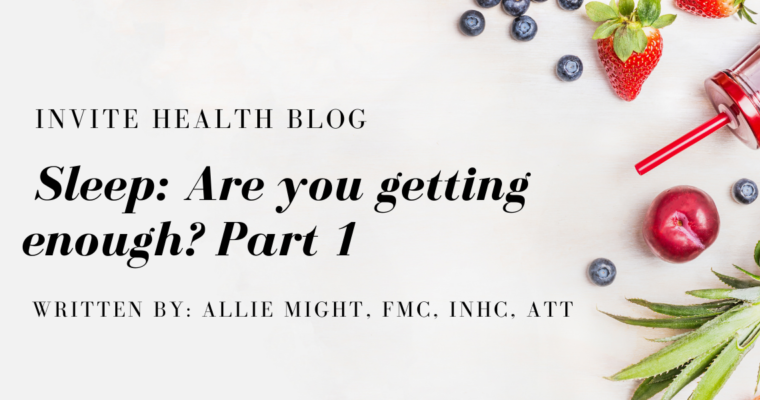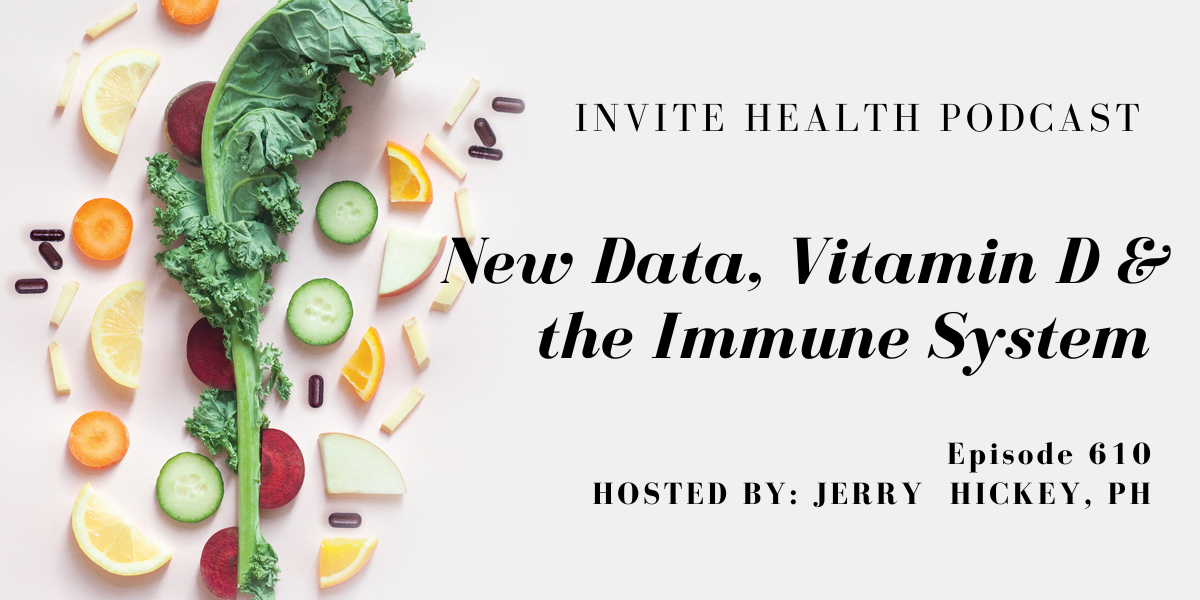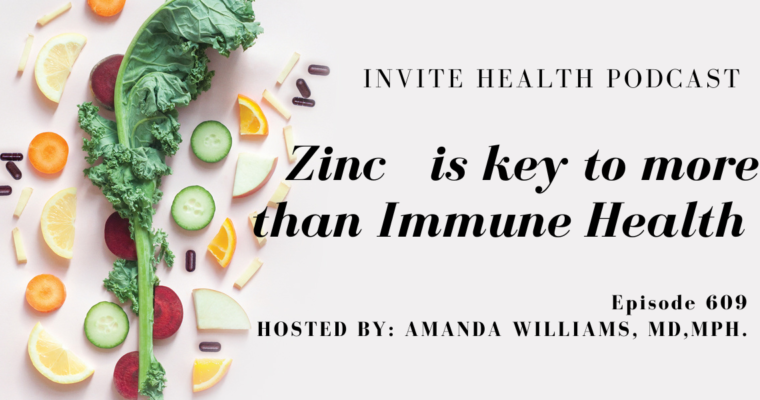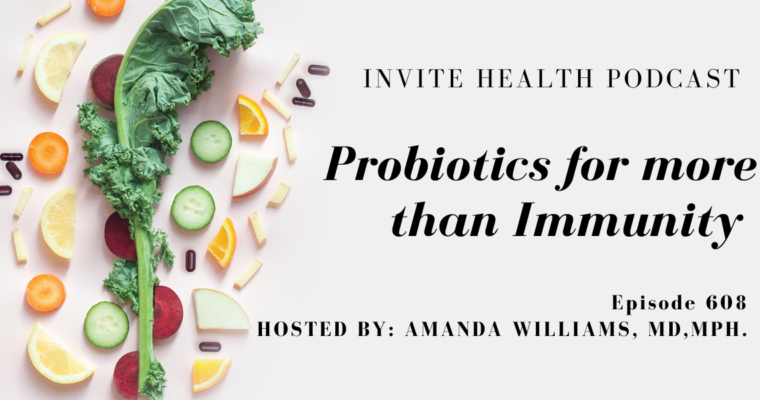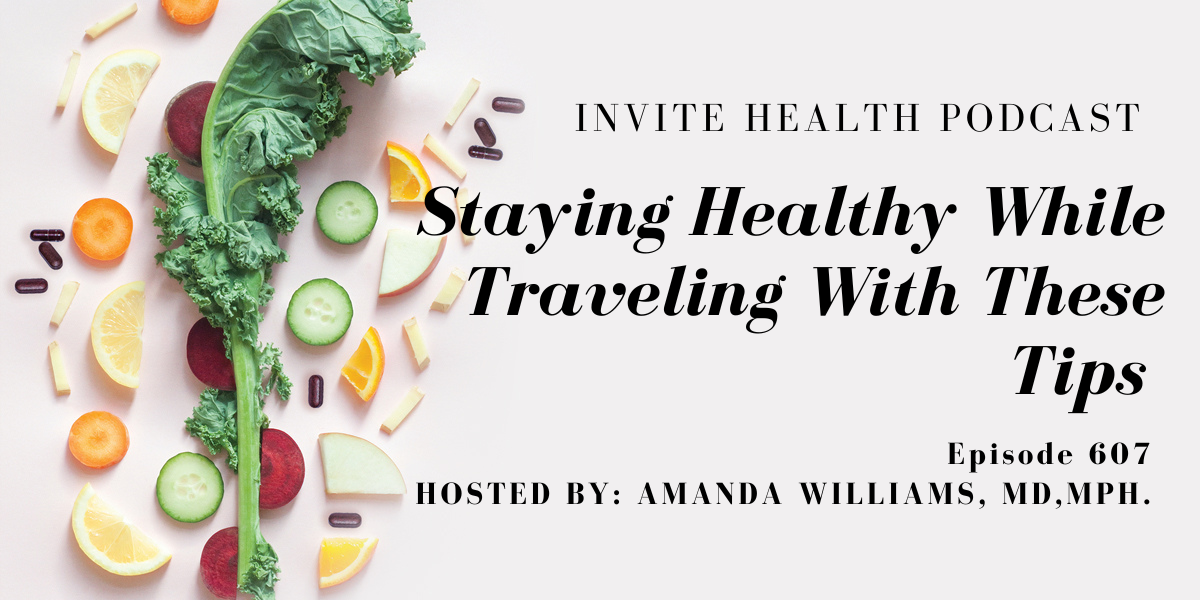Subscribe Today!
Please see below for a complete transcript of this episode.
NEW DATA, VITAMIN D & THE IMMUNE SYSTEM, INVITEⓇ HEALTH PODCAST, EPISODE 610
Hosted by Jerry Hickey, Ph.

*Intro Music*
InViteⓇ Health Podcast Intro:[00:00:04] Welcome to the InViteⓇ Health Podcast where our degreed health care professionals are excited to offer you the most important health and wellness information you need to make informed choices about your health. You can learn more about the products discussed in each of these episodes and all that Invite Health has to offer at, www.invitehealth.com/podcast. First time customers can use promo code podcast at checkout for an additional 15% off your first purchase. Let’s get started. [00:00:34]
*Intro Music*
Jerry Hickey, Ph: [00:00:40] An insufficient level of vitamin D in your blood is connected with an increased risk of developing all kinds of infections fungal infections, bacterial infections, viral infections, having low vitamin D is connected with an increased risk of developing a respiratory tract infection, which would include COVID type infections, the flu, colds, but also lacking vitamin D, just low levels increased the length of time. You may remain infected, you’ll be sick for a longer time, and possibly most importantly, lacking vitamin D is connected with an increased risk of a severe infection and winding up in the hospital and having, if it’s a respiratory tract infection, having severe, a severe attack on your lungs. Sadly, habitually lacking Vitamin D is also associated with an increased risk of dementia. Now, it’s important to put all of these things on the table, because most of the time they’re just talking about vitamin D and its effect on bone is, does it have an effect? Does it not have an effect? I think it has a very good effect on both. So hi, my name is Jerry Hickey. I’m a nutritional pharmacist, I’m the senior scientific officer over here at Invite Health. Welcome to my episode, new Data, Vitamin D, Immunity and Brain Health. You can find all of the invite podcast episode for free wherever you listen to podcasts or just go to Invitehealth.com/podcast. You can also find invite on Facebook, Twitter and Instagram at Invite Health. All of the information related to this episode is listed at the description on the website, so let’s get going. Oh, and by the way, you can also find Invite on Facebook, Twitter and Instagram at Invite Health. I said that, I said that. [00:02:31]
[00:02:32] So let’s look at some of the data. Here’s the British Medical Journal in 2017. Now it’s a meta analysis, a meta analysis means the researchers put together a bunch of studies looking at the same thing. And they go through these studies and they pick out the ones that have good data, that are explained well, that are real, that lack any type of bias. So it’s important because a good, well-done meta analysis can tell you if something works or it doesn’t work. So they found a bunch of very dependable studies, that sufficient vitamin D is repeatedly associated with a decreased risk of respiratory tract infections. You know, like the nose and a mouth, the trachea, the bronchi, the lungs, a 20% decreased risk. That’s pretty powerful if you consider how often people get respiratory tract infections like a cold or flu, reducing the incidence or risk by that figure, 20%, that’s profound. That’s a lot of people who are not getting sick. And if you’re older, where the immune system may not be as powerful as it used to be, and well functioning as it used to be, or if you have some weakened state from a condition like severe hypertension that’s not being treated or diabetes that’s not being treated, this really becomes incredibly important. Now, this is based on significant data. And they also found that daily doses of vitamin D or weekly doses work better than bolus doses, a bolus dose is like one huge dose at one time. For instance, 30,000 units like once a month didn’t really work. What worked best was taking a thousand units to 3000 units every day. So today they’ve changed the way they, they look at vitamin D, the potency of it, a thousand units would be 25 micrograms, mcg and 3000 units would be 75 micrograms. And always take your vitamin D with food, it’ll be absorbed better because it’s somewhat fatty soluble. And also look for the D3 form, which is called cholecalciferol it really seems to be superior to vitamin D2, which is ergocalciferol. [00:04:57]
[00:05:00] Now research shows that sufficient vitamin D, you could be low on vitamin D or you could be really low in vitamin D. Okay, there’s different categories, but, having sufficient vitamin D reduces your risk of infections in general, reduces your risk of upper respiratory tract infections. So that’s, you know, that’s like the mouth and the throat, reduces the severity of infections. So they’re weaker, lacking vitamin D increases your susceptibility to a variety of infections, including COVID 19 and other coronaviruses, tuberculosis, colds, influenza, another name for the flu and bacterial vaginosis. You have an increased risk of ARDS, that stands for acute respiratory distress syndrome, terrible, that’s when people need, like, a ventilator or oxygen. You have an increased risk of requiring oxygen. It can lengthen your your stay in a hospital lacking vitamin D, but it also increases morbidity, which is how sick you get, and mortality, which is obviously the end of the road from respiratory tract infections. So vitamin D is incredibly important for the immune system. And we’ll go into why in a second. Now, Vitamin D regulates the immune system, it’s the B cells and the T cells. These are sort of the educated part of the immune system, we’ll go into this. They’re loaded with receptor sites for vitamin D, so B cells, this is the acquired immune system. You basically have two parts of the immune system, there’s the innate immune system that you’re born with, pretty much born with, and then there is acquired immune system which is educated for specific infections. So that would be your T cells, which are like tigers, the tigers of the immune system, they shred things, they shred viruses and bacteria, fungi and parasites and cancer cells and B cells, which is what gives birth to your antibodies. So they’re loaded with receptors sites for vitamin D, showing how important vitamin D is for the immune system. Meaning that if you lack vitamin D, these receptors sites are not full, they don’t fill up and the cells will not work efficiently and you can have real problems.† [00:07:36]
ICYMI: IS IT A COLD? INVITE HEALTH PODCAST, EPISODE 605>>LISTEN NOW!
[00:07:39] So the macrophages and dendritic cells are also loaded with vitamin D receptor sites, a receptor site, it’s like a specific key to unlock a specific lock. In this case, it’s to activate something and control something. So only vitamin D can fit into these receptor sites. So the macrophages are these huge stay put cells like you have in the lining of your intestines and your liver, etc. and they gobble things up, they literally swallow things and release biological weapons that dissolve the infectious organism, that’s called phagocytosis. And dendritic cells are kind of like cells that coordinate the immune system, so both of these require vitamin D. So vitamin D is required for innate immunity and it’s required for adaptive immunity. In other words, it’s required for survival. Vitamin D, actually at the cellular level activates immune system proteins. Now, the second most common thing in the human body are proteins. Proteins make your connective tissue like your cartilage, proteins make your bone, proteins make your muscle, but proteins also make enzymes and hormones and things that make the body work. And in this case, these are proteins involved with the immune system. And these proteins are activated by vitamin D, and they fight viruses and they fight bacteria and they fight fungal infections, you know, like Candida albicans. So examples of these proteins are cathelicidin and defensins. These are very powerful antimicrobial peptides, tiny proteins. So a cathelicidin typically would be CAMP which stands for Cathelicidin anti-microbial peptide. An Infection triggers the vitamin D receptors in the lungs to release CAMP and CAMP helps to kill these infections. The defensins are expressed in leukocytes, leukocytes are all your white blood cells, but also epithelial cells. So these are like the cells that line your blood vessels and line your digestive tract, they line your lungs, etc. So does alpha and beta defensins. So these are these are called on by vitamin D, if you like vitamin D, perhaps not enough of these are going to be activated to keep you alive if you start to develop a severe infection. So the cathelicidins and defensins can bind to things such as the influenza virus or the flu viruses, and this reduces their ability to infect your cells. They can’t get into the cell, they can’t stick onto the cell, they can’t kill the cell, they can’t spread to other cells that care propagate. Likewise, these vitamin D related peptides inhibit bacteria, and typically across the board, viral replication, the increase in population size, increase titers of these infectious organisms.† [00:10:49]
[00:10:50] But this is also important. Vitamin D also helps protect us from our own immune system. Our own immune system can shred us. I mean, this was happening with COVID 19. People were developing a condition where their immune system was reacting to the infection to COVID 19 and causing acute respiratory distress syndrome, where certain cytokines, it was called cytokine storm, certain cytokines, chemical messengers from the immune system, like interleukin 6, were causing devastating inflammation of the lungs. The lungs were swollen with fluid and people were put on to ventilators and dying. You remember that early on with COVID 19? I Like in Central Italy and places like that, in Queens, New York, it was terrible. So Vitamin D helps prevent the over production, the over proliferation of pro-inflammatory cytokines. So that helps protect you from your immune system, destroying your lungs. I mean, examples of your immune system destroying you are all of those more dangerous forms of autoimmune diseases such as rheumatoid arthritis, systemic lupus, erythematosus, mixed connective tissue disease. These are bad diseases. It shows you how violent the immune system can be against us, the owners of the immune system, if it’s not properly controlled and you need vitamin D to help control it. So the cytokine storm, if you’re lacking vitamin D, not only increases morbidity, how sick you get winding up in the emergency room on oxygen, etc., but also mortality. Vitamin D also helps control T helper cells. T helper cells sometimes can get out of control and it can cause too much inflammation and too much cytokine production, so vitamin D helps to control the production of interferon gamma related to T helper cells and TNF alpha, TNF alpha is also called cachexia, that’s involved with that wasting syndrome you see in people with advanced cancer. Another name for TNF Alpha is tumor necrosis factor alpha, it can be nasty when it’s out of control. Vitamin D has been shown to reduce the risk of developing COVID, the flu and cold infections.† [00:13:06]
[00:13:07] Here’s a fairly recent study from Boston University School of Medicine. It’s in PLOS One, which is a great group of journals, American journals that are open access, meaning anybody can go in there and read them. You don’t have to pay for it because we taxpayers pay for it. So here’s Boston University School of Medicine Research, in patients who are hospitalized with COVID 19, blood levels of vitamin D at or greater than 30 nanograms per milliliter, that’s, you want a minimum of 39 nanograms per milliliter, we’ll go into your blood level of vitamin D later, and what that means. They had a decreased and their risk of becoming unconscious, they had a decreased risk of becoming hypoxic, in other words, being starved for oxygen and added decreased risk of dying from COVID shows you the connection between vitamin D and the immune system, but also their Hs-crp was lower, that’s very interesting. I have my hs-crp checked at least once a year, hs-crp stands for highly sensitive C-reactive protein. It’s a peptide, a small protein made by the liver when you’re inflamed. So we don’t know exactly what it does, if it harms you or if it’s meant to protect you. But it’s a proxy for inflammation. So you want your Hs-crp to be below one, that’s normal, that’s normal level of inflammation, things are going as expected. If it’s two, because this is a very sensitive measure, it indicates that you have inflammation in your blood vessels and you’re actually developing atherogenesis as we speak, athrogenesis is starting to clog your arteries, you know, developing blockages in the arteries, hardening of the arteries. And if it’s over three in a research shows that you have an increased risk not just of developing heart disease, but also of that plaque becoming highly unstable, plaque vulnerability and breaking off and causing a stroke or heart attack. So you want your hs-crp lower and they show to even in these people with a severe infection, their hs-crp was more under control. That’s a great finding.† [00:15:11]
[00:15:12] They also had a higher concentration of lymphocytes. Now that’s good. Lymphocytes are the acquired immune system, what we call before the educated immune system. There’s basically three groups of cells in there. There is the natural killer cells, there’s the T cells, there’s the B cells, there’s the T cells, and there’s the natural killer cells. The B cells develop the antibodies, that’s where the antibodies are formed. And the antibodies are very specific for specific viruses and bacteria, etc. So, for instance, if somebody had the flu, they develop specific antibodies to that flu. The next time that flows around, they have a lower risk of becoming sick or at least becoming very sick. They have a lower risk of becoming very sick. And that’s what the flu shots are based on. So B cells create antibodies. T cells do a lot of things, they’re like, oh, they could be monsters. I mean, they go in there and they shred infections, they control the immune system, they bring in immune cells, and they at the end of the infection, if they’re working properly, they call off the immune system. And then there’s natural killer cells, which are bridge cells that have kind of a memory, all these cells have a memory. And the acquired immune system, they all have a memory for specific infections. So the natural, what happens your innate immune system, the part you’re kind of born with, with that kind of peters out after about three days, it’s getting fatigued like the neutrophils that are becoming fatigued that your most common white blood cell, so the lymphocytes are not ready to function yet, the T cells are not functioning yet. You haven’t made antibodies yet, you need a bridge cell between those, that’s called a natural killer cell. So you need vitamin D also for the natural killer cells, just like you need vitamin C and Zinc, by the way.† [00:17:11]
[00:17:13] Now, getting back to this Boston University School of Medicine study, their hs-crp was lower, so they were less inflamed, that’s a good sign. And they had a higher concentration of these lymphocytes, like the the antibodies and the T cells and having sufficient vitamin D decreased the risk in general of catching COVID 19 by 54% by 54%, having sufficient Vitamin D. So what do you look for? What do you look for with vitamin D? Well, you want D3 the studies show that D3 seems to work longer and more efficiently and effectively in humans than D2. D2 is called ergocalciferol, D3 is cholecalciferol, and you want 25 micrograms to 75 micrograms a day. You take it with food, it’s absorbed better because it’s fatty soluble. 25 micrograms, the old way would be a thousand units, 75 micrograms would be 3000 units. And the blood, when they do a blood test, they look at 25 hydroxy-cholecalciferol. So I’ll give you a little background on that, and I don’t think we’re going to get to the part about vitamin D and memory and Alzheimer’s today in brain health. Well, we’ll probably have to do a separate episode because this is taking longer than I thought it would.† [00:18:35]
[00:18:38] When a doctor takes your blood test for vitamin D, they’re looking at the inactive form. They’re not looking at the active form. The inactive form is called 25 hydroxycholecalciferol, so if you have young skin and light skin and you get enough sun, the sun hits the cholesterol in your skin and convert to 25 hydroxycholecalciferol, which is stored in the liver. That lasts about a week in the bloodstream and then that’s released and through the function of magnesium and the kidneys, it’s converted to the active form of vitamin D, which is 125- dihydroxycholecalciferol. So when doctors check your vitamin D, they’re not looking at the active form. They’re looking at the storage form because it lasts longer. The active form only last less than a day, so it’s hard to test. So the trick with having the active form of vitamin D is make sure you get enough of the mineral magnesium you want, really about 350 to 400 milligrams of the mineral magnesium every day. We’ve done a number of episodes on magnesium as a very important mineral. You might want to listen to some of those episodes. Now, there’s an increased requirement for vitamin D in obese people because the vitamin D gets trapped in their fat cells and it’s not getting its chance to function and protect them. This is true of other nutrients also, not just vitamin D. And diabetics really have an increased requirement for vitamin D. The vitamin D works in conjunction with magnesium and zinc to help control their blood sugar. So obese people and diabetics need more vitamin D than the general public, now, who shouldn’t have it? Well, it’s possible that people with mixed connective tissue diseases shouldn’t have it. I don’t know, that remains to be seen. They’re a very rare and severe type of autoimmune disease and people with very high blood levels of calcium. See, vitamin D allows you to absorb calcium and phosphorus from the intestines, but if you vitamin D is high, it’s also gonna trap the calcium in your body. So if your calcium is very high in your blood, you don’t want a lot of vitamin D, possibly people with parathyroid disease, not sure about this. Now, parathyroid is not your thyroid gland, your thyroid gland is involved with regulating your metabolism and energy and your cholesterol, etc. And it’s very important for your brain and your memory and your IQ, etc. The parathyroid means para near the thyroid, they’re like little grains of sand and they’re involved with calcium. That’s how important calcium is to the human body involved with regulating calcium. So I did read many years ago, but I haven’t followed up on it because parathyroid disease is not something I come across very often. I think in my entire career I’ve come across one person with parathyroid disease, so it’s not something we normally see or if somebody has it, they may not know, but it’s very rare. And in people with parathyroid disease, their calcium blood level is going high. So they seem to be urinating out their vitamin D or excreting their vitamin D somehow to try and regulate their calcium. So people with mixed connective tissue diseases, people have elevated calcium in their blood, that’s very high, and people with parathyroid gland disease may not be able to use vitamin D. They really need to talk to their doctor about that, doctor who specialize in that.† [00:22:28]
[00:22:29] So what’s a desired blood level? Certainly over 30 nanograms per milliliter under 30 nanograms per milliliter. You’re missing many, many, many of the benefits of vitamin D. Now, ideally, for the many studies I’ve read, you want your vitamin D between 55 and 75, but don’t worry, over 45 is great. There’s not much difference between a blood level of 45 and 55 as far as the benefits, it’s just a tiny difference. If your blood levels are higher than 100, it becomes toxic. But this is extremely rare. I know it’s very hard to get a vitamin D level that high. It’s hard to get a vitamin D level of 45, never mind 100. Now, if you’re doing a lot of vitamin D, you want vitamin K, there’s different forms of vitamin K, and I’ll tell you why. As far as calcium, vitamin D just brings calcium into the body and keeps it around, so it’s for calcium availability, but it doesn’t chaperon calcium, it doesn’t tell the calcium where to go, that’s vitamin K. So vitamin K will keep calcium away from men’s prostates and away from your heart, your blood vessels in your heart and away from women’s breasts. And the Vitamin K will literally lift the calcium and shove it into the bone. So there’s three different vitamin K, the vitamin K dependent enzymes that achieve this. So if you’re doing a lot of vitamin D, you want to pay attention to your vitamin K, you could get vitamin K in beans and soy foods and tea and also in green leafy vegetables, which is where I get most of my vitamin K from. And you can also take a vitamin K supplement, low potency vitamin K supplement.† [00:24:12]
[00:24:14] Vitamin D is also needed to activate melatonin, now, that’s important because melatonin, there’s also receptor site for melatonin on immune cells. You need melatonin to be activated for the immune system to work. So Vitamin D not only activates and regulates the immune system and helps prevent inflammation on the body caused by the immune system, it also activates melatonin, which is part parcel of immune system function. We’ve done podcast episodes on that also, you might want to look at that melatonin and the immune system. Melatonin also is needed to build bone. So that’s a different way that vitamin D is needed for bone health. It’s not just regulating calcium, but it activates melatonin. Melatonin at night is really important for building bone. The vitamin D is needed for your immune system. Of course, vitamin D, when it activates melatonin, melatonin is needed for good digestion, for digestive health function. And melatonin has some kind of effect on sleep. And you also need melatonin for your memory and learning. So Vitamin D has a lot of benefits that may not be discussed very frequently. Now, you you might want to look at my last episode, which was vitamin C and the one before that, which was the common cold, because all of these things weave together. So I did one recently. Is it a cold or is it something else? I did one recently on vitamin C and immune system, an update. Other things that help with the immune system of course, some physical activity, not overdoing it. Overdoing physical activity suppresses the immune system, but if you get a good half hour a day, a good exercise, it’s great for the immune system. Of course, if people can cover their nose and their mouth with their elbow, when they sneeze or cough, it’s good for everybody. Sufficient sleep is needed for a properly functioning immune system. Eating good foods and protein is needed.† [00:26:15
ICYMI: AN UPDATE ON VITAMIN C & THE IMMUNE SYSTEM, INVITE HEALTH PODCAST, EPISODE 606>>LISTEN NOW!
[00:26:17] Green tea is helpful with the immune system, very interesting. I’ve done podcast episodes on that also. Having a lot of sugar suppresses the immune system for hours and drinking alcohol, especially over two drinks, suppresses the immune system for hours. So you really might want to avoid that right now. Now, my intention was also to talk about vitamin D and the brain. I just got a whole bunch of good data, but I’m going to have to do that separately. So thanks for listening today. You could find all of our podcast episodes from Invite Health anywhere where you listen to podcasts for free or just go to invitehealth.com/podcast and if you could subscribe and leave a review, it’s very helpful, thank you. We’re also found on Facebook, Instagram and Twitter at Invite Health. I want to thank you for listening today and hope to see you next time on another episode of your InViteⓇ Health Podcast which will be on Vitamin D and the brain. Very interesting stuff has come out very recently. Jerry Hickey signing off and thanks for listening.† [00:26:17]
*Exit Music*


